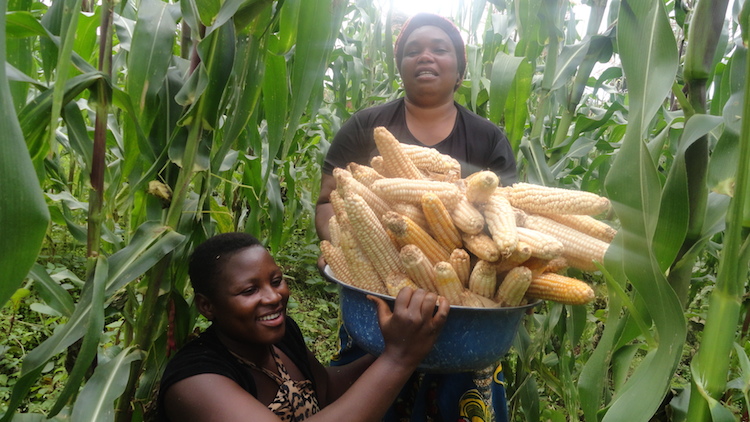
The world is teetering on the brink of global hunger and food insecurity. One important way of averting such destruction is to improve agriculture to be more resilient to climate change which is already exacting a toll on both developing and developed countries. MOSHE TSEHLO in LESOTHO takes an insight in to these challenges.
Achieving this means using the environment, on which agriculture depends more sustainably. In particular the world will need to tackle three environmental issues: declining diversity, water scarcity and climate change in a way that does not compromise developmental goals. Delivering pro-poor sustainable and more productive agriculture requires policy makers to integrate environment more intricately into food security and farming policies, programmes and funding decisions.
Agriculture is both a driver and victim of climate change, on the one hand, the carbon emissions of each link in the industrial food chain from seed to plate including the production of inputs such as fertilizers, all contribute to climate change.
The impacts of climate change – increasing rainfall variability, saltwater intrusion, shorter planting seasons, changing patterns of pest and diseases and more frequent extreme events such as floods and droughts all serve to change crops, degrade land and reduce crop harvest. These can have devastating economic impacts.
There is a growing recognition that ensuring food security over the coming decades requires climate smart agriculture that is intensive, efficient, resilient, sustainable and low carbon. There are two principal routes to climate-smart agriculture: mitigation strategies that reduce agricultural emissions and adaptation strategies that help agriculture cope with changing climates.
In both cases, the most successful approaches will also help reduce poverty and improve quality of life and livelihoods.
Practices
It is increasingly clear that effective climate –smart practices already exist.
Mitigation strategies such as conservation agriculture, organic farming, grazing land management and agro forestry are notable examples. Adaptation can be reactive, for example, changing planting seasons or controlling soil erosion or it can be proactive, anticipating impacts before they happen.
The impacts of climate change are already perceived and are expected to result in increased frequency and severity of droughts, floods, cyclones, sea level rise and other extreme weather events which are detrimental to marine and terrestrial ecosystems, water resources, food security, health, infrastructure and overall economic development.
Most African countries are vulnerable to these impacts mainly because of high poverty level; reliance on rain fed agriculture, lack of access to technology and improved production practices. But increasing food production to meet future needs, while necessary, is not sufficient, it will not allow significant progress in combating hunger and malnutrition if it is not combined with higher incomes and improved livelihoods for the poorest- particularly small- scale farmers in developing countries.
And short-term gains will be offset by long-term losses if it leads to further degradation of ecosystems, threatening future ability to maintain current levels of production.
It is possible, however to significantly improve agricultural productivity where it has been lagging behind, and thus raise production where it needs to be raised it in poor, food-deficit countries and at the same time improve the livelihoods of smallholder farmers and preserving ecosystems. This would slow the trend towards urbanization in the countries concerned, which is placing stress on public services of these countries.
It would contribute to rural development and preserve the ability for the succeeding generation to meet its own needs. It would also contribute to the growth of others sectors of the economy by stimulating demand for non-agricultural products that would result from higher incomes in rural areas.
To achieve this, however, pouring money into agriculture will not be sufficient; what is most important is to take steps that facilitate the transition towards a low-carbon, resource-preserving type of agriculture that benefits the poorest farmers. This will not happen by chance. It can only happen by design, through strategies backed by strong political will, and informed by a right-to-food approach.
Going forward
Moving towards sustainability is vital for future food security and an essential component of the right to food. But in order to succeed in this transformation, consistency will be required across a variety of areas.
States will need to invest in multi-year efforts, based on strategies identifying the measures that should be adopted in order to make this transition.
There is a growing recognition that ensuring food security over the coming decades requires climate –smart agriculture that is intensive, efficient, resilient, sustainable and low carbon.
As part of their obligation to devote the maximum of their available resources to the progressive realization of the right to food, states should implement public policies supporting the adoption of agro ecological practices by:
Making references to agro-ecology and sustainable agriculture in national strategies for the realization of the right to food and by including measures adopted in the agricultural sector in national adaptation plans of action (NAPAs) and in the list of nationally appropriate mitigation actions (NAMAs)adopted by countries in their efforts to mitigate climate change.
Reorienting public spending in agriculture by prioritizing the provision of public goods, such as extension services, rural infrastructures and agricultural research, and by building on the complementary strengths of seeds-and –breeds and agro ecological methods,
Engage in long-term relationships with partner countries, supporting ambitious programs and policies to scale up agro ecological approaches for lasting change, including genuine multi-polar engagement with public authorities and experts.
Moshe is the director of the participatory Ecological Land use management in Lesotho











